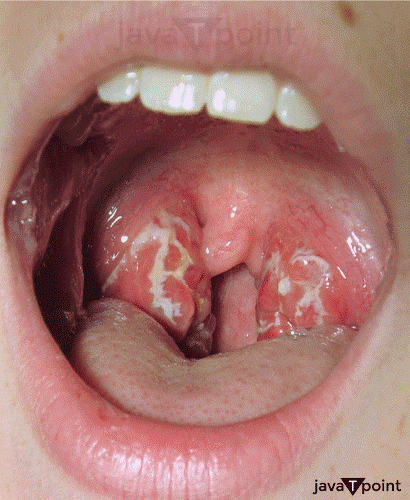Tonsillitis DefinitionTonsillitis is an infection-related inflammation of the tonsils in the back of the throat. The soft tissue lumps, known as the tonsils, are on either side of the throat. Germs and viruses bring it on, and it is infectious. Inflamed and enlarged tonsils, a sore throat, uncomfortable swallowing, observed as drooling in young children, swollen and irritated lymph nodes on the sides of the neck, stiff neck, fever, a scratchy or muffled voice, poor breath, and headache are the most typical symptoms of tonsillitis. Tonsillitis is an infection-related inflammation of the tonsils in the back of the throat. The soft tissue lumps, known as the tonsils, are on either side of the throat. Germs and viruses bring it on and are infectious. 
Inflamed and enlarged tonsils, sore throat, hard swallowing, observed as drooling in young children, swollen and irritated lymph nodes on the sides of the neck, stiff neck, fever, a scratchy or muffled voice, poor breath, and headache are the most typical symptoms of tonsillitis. Tonsils are oval-shaped lumps of lymph gland tissue on both sides of the back of the throat. Tonsillitis is an infection and swelling of the tonsils. The tonsils often prevent infections. They function as filters to stop germs and viruses from entering the body through the mouth and sinuses. The tonsils boost the immune system to manufacture antibodies to help cure illnesses. Tonsillitis can affect people of any age, although it most frequently affects kids between the ages of five and ten. Tonsillitis may affect everyone, regardless of race or ethnicity. Tonsillitis is a common childhood illness for most kids. However, it seldom strikes before the age of two. It usually happens between the ages of four and five; bacterial illnesses usually happen later. History Of Study Of TonsillitisInflammation of the tonsils in the back of the throat is a frequent symptom of tonsillitis. Tonsillitis research has a long history, going back to a time when medical knowledge was only evolving. The founder of medicine, Hippocrates, originally outlined the signs and symptoms of tonsillitis in his writings in ancient Greece. His diagnosis of a throat infection indicated that the tonsils were swollen, and he advised gargling with salt water to assist in relieving the symptoms. The research on tonsillitis became increasingly organized in the 19th century. French physician Guillaume Dupuytren initially explained the link between tonsillitis and rheumatic fever. He observed that rheumatic fever, a dangerous inflammatory disorder that affects the joints, heart, and other organs, might manifest in certain tonsillitis patients. The German physician Friedrich Krause understood that a bacterial infection was the root cause of tonsillitis around the beginning of the 20th century. He pinpointed the bacterium that was causing the disease and suggested using antibiotics to cure it. Tonsillitis diagnosis and therapy have developed over time. Tonsillectomy (the surgical removal of the tonsils) was a standard therapy for recurrent tonsillitis in the 1950s and 1960s. However, in recent years, medical professionals have grown less likely to advise tonsillectomy and now only do so when the disease is severe or recurring. Causes of TonsillitisThe term "cause," often spelled "etiology" and "aetiology," refers to the genesis or explanation for anything. The term "aetiology" comes from the Greek "o," "aetiology," which means "giving a reason for". The term "aetiology" in medicine describes the reason or causes of illnesses or pathologies. The immune system's first line of defense against viruses and germs that enter your mouth is your tonsils. The tonsils may be particularly susceptible to infection and inflammation as a result of this role. The immune system of the tonsil begins to deteriorate after adolescence, which may be the cause of the uncommon instances of tonsillitis in adults.
Symptoms Of TonsillitisDepending on the illness's underlying cause, tonsillitis's signs and symptoms might change. However, a few widespread signs include:
Tonsillitis can occasionally result in earache, a stiff neck, and foul breath. It's critical to consult a doctor if you have any of these symptoms to identify the underlying issue and obtain the proper care. Facilities For Treatment Of The TonsillitisThere are several choices for treating tonsillitis, ranging from over-the-counter medications to more involved medical procedures. The finest tonsillitis treatment centers are ones that provide a variety of solutions catered to each patient's specific need. Taking care of the symptoms, which can include a painful throat, trouble swallowing, and fever, is one of the first stages in treating tonsillitis. In addition to throat sprays or lozenges, over-the-counter pain medications like ibuprofen or acetaminophen can help reduce discomfort. Prescription drugs could be required in more severe situations. While antiviral drugs may be administered for tonsillitis brought on by a viral illness, antibiotics can be beneficial in treating tonsillitis brought on by bacterial infections. Surgical intervention may be required when tonsillitis is chronic or recurring. The surgical removal of the tonsils, or a tonsillectomy, is a standard therapy for severe or persistent tonsillitis. This technique can be done as an outpatient procedure and is commonly done under general anesthesia. It's crucial to pick a center with experience treating tonsillitis while looking for tonsillitis therapy. Primary care doctors, pediatricians, and ear, nose, and throat specialists may fall under this category. These experts can assist with the condition's diagnosis and offer suitable treatment choices. Some self-care techniques can aid with tonsillitis symptoms in addition to medical treatments. These could include drinking lots of water, getting plenty of sleep, and avoiding irritants like alcohol or cigarette smoke. The following are some of India's top facilities for tonsillitis treatment:
These are only a handful of the numerous top-notch medical professionals in India that give tonsillitis treatment. It is crucial to conduct your due diligence and locate a suitable supplier based on location, specialization, and availability. Preventive MethodsInfectious microorganisms spread both bacterial and viral tonsillitis. Therefore, maintaining excellent hygiene is the greatest form of preventive.
Although using these preventative measures won't ensure that you never get tonsillitis, they can help lessen the likelihood and severity of the ailment. To ensure you get the right care if you have tonsillitis, it's crucial to consult a doctor as soon as possible. Teach Your Youngster To:
The tonsils, two tiny lumps of tissue at the back of the throat, become inflamed as a result of tonsillitis, a frequent illness. The underlying reason, the severity of the symptoms, the patient's age and general health, and the treatment options for tonsillitis are all dependent on these factors. Following are a few typical treatments for tonsillitis:

A healthcare professional should be consulted for a correct tonsillitis diagnosis and treatment strategy. Most tonsillitis cases may be effectively treated with the right care, and complications can be avoided.
Next TopicVapour Pressure Definition
|
 For Videos Join Our Youtube Channel: Join Now
For Videos Join Our Youtube Channel: Join Now
Feedback
- Send your Feedback to [email protected]
Help Others, Please Share










